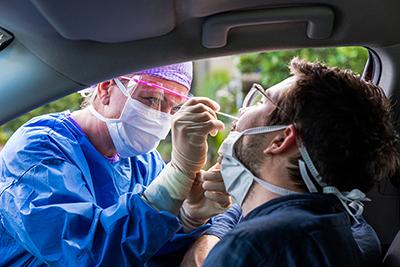
The importance of on-line educational resources that connect scientists with young learners has been brought into sharp focus during the COVID-19 pandemic.
In this blog, Dr Eleanor Watson describes a new curriculum-linked resource, which details the technology that is used to detect the SARS-CoV-2 virus and diagnose COVID-19.
By engaging with school students, scientists have an opportunity to enhance learning, share their passion for their subject, demonstrate the relevance of subject areas and highlight a diversity of career opportunities. The Scottish Curriculum for Excellence (CfE) connects students to important issues in their changing world and covers key areas where scientists in Scotland are making important research contributions.
At the start of the COVID-19 outbreak, a team of researchers from Moredun, the James Hutton Institute and the Rowett Institute were in the process of developing on-line educational resources focussing on microbes and their impact, both good and bad, on people’s lives. The, SEFARI Gateway Responsive Opportunity Funded, science education project provides resources to support teachers and learners in the form of case-studies, activities and up-to-date information.
Meanwhile experts from across the whole of SEFARI also began working together to make our existing educational resources, which span a wide range of topics, more readily available to teachers, learners and parents to aid with home schooling. As a result of both activities we realised we could also consider ways to generate new material, related to the COVID-19 pandemic.
As testing is such an important area to help control the pandemic, we decided to explain the science behind the NHS testing for COVID-19 infection, whilst reinforcing learning outcomes for Higher Biology and demonstrating the relevance of the subject area.
The test that is currently used by the NHS to detect SARS-CoV-2, the coronavirus that causes COVID-19, involves a technique called the polymerase chain reaction (PCR) and an understanding of this process is also a key area in Higher Biology. PCR is a fundamental method used across many areas of biological research, including DNA fingerprinting, forensics and biotechnology, and across human and veterinary medicine where it is applied to the diagnosis of infectious diseases.
The booklet outlines the steps involved in the PCR method, describes the scientific principles underpinning the technique and also highlights some of the challenges involved in public health diagnostic testing. Disease surveillance is a SEFARI research focus, often involving rapidly emerging bacteria and viruses that can cause disease in animals and people. The resource offers an understanding and appreciation of the work as well as the numerous considerations that are involved in developing a robust testing system in response to a pandemic. The partnering of two SEFARI institutions, Moredun and Scotland’s Rural College (SRUC) Veterinary Services with NHS Scotland to support COVID-19 testing has brought this relevance even closer to home, fully demonstrating the importance of one health principles.
The COVID-19 pandemic is a stark reminder of the devastating effect and global impact that some pathogenic microbes can have, and the importance of ensuring the public are well informed. However, it is also important that we equally understand the huge benefits that other microbes can bring. The wider aims of our SEFARI Gateway funded project are to provide more information on other microbes and how they relate to gut health, food safety, food production and the environment, with an emphasis on how all these areas are connected. A web-based resource will be launched later this autumn, providing a range of information and material on these topics, also related to our research within SEFARI – so watch this space!
If anyone would like to get in touch with regard to any of our educational resources, then please contact info@sefari.scot